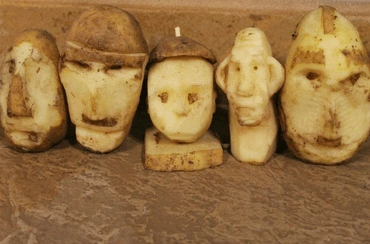1
Und das Wort Jehovas geschah zu mir also:
2
Und du, Menschensohn, willst du richten, willst du richten die Stadt der Blutschuld? So tue ihr kund alle ihre Greuel und sprich:
3
So spricht der Herr, Jehova: Stadt, die Blut vergießt in ihrer Mitte, damit ihre Zeit komme, und welche sich Götzen macht, um sich zu verunreinigen!
4
Durch dein Blut, das du vergossen, hast du dich verschuldet, und durch deine Götzen, die du gemacht, hast du dich verunreinigt; und du hast deine Tage herbeigeführt und bist zu deinen Jahren gekommen. Darum habe ich dich den Nationen zum Hohne gemacht und allen Ländern zum Spott.
5
Die Nahen und die von dir Entfernten werden dich verspotten als befleckten Namens und reich an Verwirrung. -
6
Siehe, in dir waren die Fürsten Israels, ein jeder nach seiner Kraft, um Blut zu vergießen.
7
Vater und Mutter verachteten sie in dir, an dem Fremdling handelten sie gewalttätig in deiner Mitte, Waisen und Witwen bedrückten sie in dir.
8
Meine heiligen Dinge hast du verachtet und meine Sabbathe entweiht.
9
Verleumder waren in dir, um Blut zu vergießen; und auf den Bergen in dir haben sie gegessen, sie haben in deiner Mitte Schandtaten verübt.
10
In dir hat man die Blöße des Vaters aufgedeckt, in dir haben sie die Unreine in ihrer Unreinigkeit geschwächt.
11
Und der eine hat Greuel verübt mit dem Weibe seines Nächsten, und der andere hat seine Schwiegertochter durch Schandtat verunreinigt, und ein anderer hat in dir seine Schwester, die Tochter seines Vaters, geschwächt.
12
In dir haben sie Geschenke genommen, um Blut zu vergießen; du hast Zins und Wucher genommen und deinen Nächsten mit Gewalt übervorteilt. Mich aber hast du vergessen, spricht der Herr, Jehova.
13
Und siehe, ich schlage in meine Hand wegen deines unrechtmäßigen Gewinnes, den du gemacht hast, und über deine Blutschuld, die in deiner Mitte ist.
14
Wird dein Herz feststehen, oder werden deine Hände stark sein an dem Tage, da ich mit dir handeln werde? Ich, Jehova, habe geredet und werde es tun.
15
Und ich werde dich versprengen unter die Nationen und dich zerstreuen in die Länder und deine Unreinigkeit gänzlich aus dir wegschaffen.
16
Und du wirst durch dich selbst entweiht werden vor den Augen der Nationen; und du wirst wissen, daß ich Jehova bin.
17
Und das Wort Jehovas geschah zu mir also:
18
Menschensohn, das Haus Israel ist mir zu Schlacken geworden; sie alle sind Erz und Zinn und Eisen und Blei im Schmelzofen; Silberschlacken sind sie geworden.
19
Darum, so spricht der Herr, Jehova: Weil ihr alle zu Schlacken geworden seid, darum, siehe, werde ich euch in Jerusalem zusammentun.
20
Wie man Silber und Erz und Eisen und Blei und Zinn in einen Schmelzofen zusammentut, um Feuer darüber anzublasen zum Schmelzen, also werde ich euch in meinem Zorn und in meinem Grimm zusammentun und euch hineinlegen und schmelzen.
21
Und ich werde euch sammeln und das Feuer meines Grimmes über euch anblasen, daß ihr in Jerusalem geschmolzen werdet.
22
Wie Silber im Ofen geschmolzen wird, also werdet ihr in Jerusalem geschmolzen werden. Und ihr werdet wissen, daß ich, Jehova, meinen Grimm über euch ausgegossen habe.
23
Und das Wort Jehovas geschah zu mir also:
24
Menschensohn, sprich zu ihm: Du bist ein Land, das nicht beschienen, nicht beregnet wird am Tage des Zornes.
25
Verschwörung seiner Propheten ist in ihm; gleich einem brüllenden Löwen, der Beute zerreißt, fressen sie Seelen, nehmen Reichtum und Kostbarkeiten, mehren seine Witwen in seiner Mitte.
26
Seine Priester tun meinem Gesetze Gewalt an und entweihen meine heiligen Dinge; zwischen Heiligem und Unheiligem unterscheiden sie nicht, und den Unterschied zwischen Unreinem und Reinem tun sie nicht kund; und vor meinen Sabbathen verhüllen sie ihre Augen, und ich werde in ihrer Mitte entheiligt.
27
Seine Fürsten in ihm sind wie Wölfe, die Beute zerreißen, indem sie Blut vergießen, Seelen vertilgen, um unrechtmäßigen Gewinn zu erlangen.
28
Und seine Propheten bestreichen ihnen alles mit Tünche, indem sie Eitles schauen und ihnen Lügen wahrsagen und sprechen: So spricht der Herr, Jehova! Und doch hat Jehova nicht geredet.
29
Das Volk des Landes verübt Erpressung und begeht Raub; und den Elenden und Dürftigen bedrücken sie, und den Fremdling übervorteilen sie widerrechtlich.
30
Und ich suchte einen Mann unter ihnen, der die Mauer zumauern und vor mir in den Riß treten möchte für das Land, auf daß ich es nicht verderbte; aber ich fand keinen.
31
Und ich gieße meinen Zorn über sie aus, vernichte sie durch das Feuer meines Grimmes; ich bringe ihren Weg auf ihren Kopf, spricht der Herr, Jehova.







